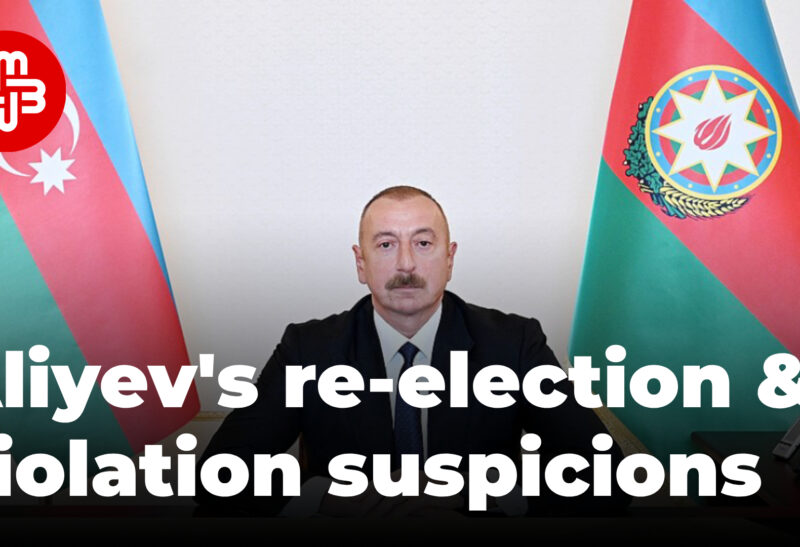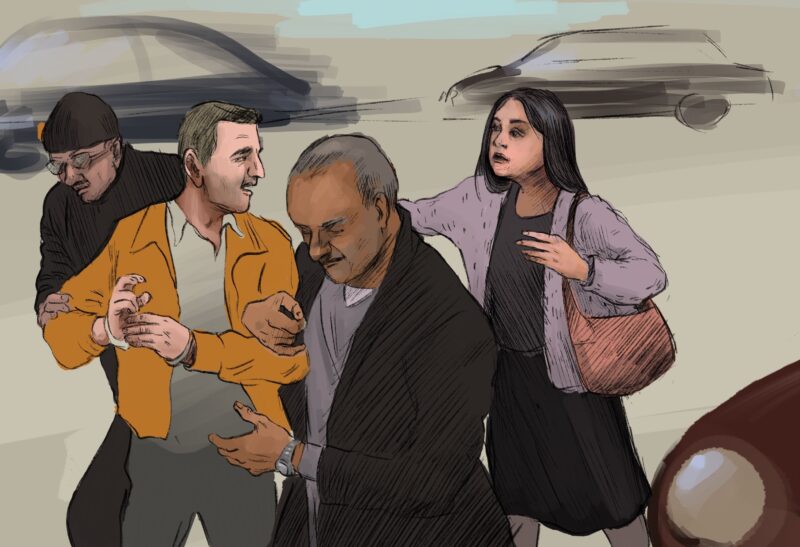

In Azerbaijan, the difference between the capital and the other regions when it comes to welfare and infrastructure is stark. For example, the regions have virtually no cultural, social or intellectual life, which drives the educated to the capital. Intellectual or creative people of these regions find that the only way to express themselves is to leave for the capital.
But some stay. The selfless and strong people, for the sake of their native region’s success, refuse to leave. They keep their intelligence and ‘light’ in their villages, maintaining the same life; supporting the people living in the same situation. Publicist Nazli Agayeva is one such person.
– Miss Nazli, let’s talk about you, first. For example, what kind of family, childhood and adolescence did you have? What differences have you seen in Kabala since your childhood?
– I was born in one of the most remote villages of the region, into a large family. I was the youngest girl. I have just one younger brother. The rest are older. When we were children, we had adult and married siblings. The village was made up of farms and agricultural activity. It was a typical Soviet village. The village children went to farm with their mothers and herd cattle with their fathers. In their free time, whoever went to school mostly had lessons with my aunt’s son and my brother. I got bored sitting between those older children all day having formal lessons, but I liked school very much. Taking orders from adults at home was like torture, but the first opportunity I had to read a book made this torture much less. When I had time as a youngster, I read all the famous works of literature. I didn’t attend wedding parties like the other girls did. When I saw my sister’s children dancing, I felt ashamed and hid. Kabala was called Gutgashin at the time. Our generation which is becoming extinct will always know it as Gutgashin. The Gutgashin of my childhood and youth and Kabala are divided by stereotypes. We were netiher thankful nor neglectful.
– Usually, educated, capable people come to the capital, especially in their youth. They want to try to become successful there. Why did you chose to stay in the province?
– Believe me, when I was young, I didn’t have time to prove myself. I was an ordinary person in our home, but I ignored all of the anxiety and tried to do something about it. My mother was taking care of her sisters while she had a baby herself; she was living with the difficulties of her own family. My sister’s father died suddenly. I wanted to do something to make her happy… Unfortunately, my aunts only lived about 20 years. My sister and I got married when we were young. With my mother’s delicate and weak heart, those traumas were always there. My father and his first wife loved those orphans and my mother’s baby like their own, but the fate of my mother’s life was a constant punishment and she was full of regret forever. Because my delicate mother was in such a desparate situation, she didn’t take what wasn’t hers.
When I lost my father and that wonderful woman—out great mother—after that, my mother couldn’t stay in that home or that village any longer. I brought her to live with me. I worked at a local newspaper in winter as a fire stoker. In summer, as a housekeeper at the local disctrict center. Since then, we had a difficult but meanngful life together. In the past, I didn’t think I could be separated from my mother and this district, but over time, I understood it was just an excuse. If my mother was separated from her homeland, another district or the capital wouldn’t make a difference to her. She could adapt better than I could. That means I was the one who had the problem, because I haven’t had my mother for six years. There is no reason connecting me to those places; I’m still rotting in this invaded city. Naturally, at this age you can’t say you’ll go to the capital and they will agree with it. You hand yourself over to their charge.
– Women: writing and having a social life. These things can work together and are just accepted in the big cities. Even then, outside of Baku sometimes it’s not acceptable. But you’re doing this in a village. Are you worried about that?
– In a village, just writing and having a social life and being a conscious woman is enough to invite trouble. You don’t want to answer to any demanding standards. What a shame that villagers will turn against you. Women of the community will call you immoral because you communicate with men. They will create rumors and declare themselves blameless. They will say they’re so sorry other people don’t understand modern women like you. Looking into your eyes they will complain about how boring village life is. If you don’t give the expected reaction and try to excuse yourself to get away, they will spy on you and create gossip about you.
I was the only source of local entertainment for years. I was the only secretary in that district, trying to solve those people’s problems, which was difficult. I knew they thought I was crazy, but I never turned my back on them. After writing some harsh articles, some of them began to ignore me, but I didn’t say anything, hoping they would be ashamed of themselves. I’m sure whoever does my job after me will have much more civilized working conditions. After all, this is the internet age; it will change the village, too.
–
You have been through the Soviet, transitional and modern periods of journalism. Can you give a brief assesment of each era?
– Even in Soviet times, there was enthusiasm. Most of the audience admired the real words. Good articles passed from hand in hand and were discussed over and over again.
During the transition period, yesterday’s comrade was Sir the next day, and there was confusion. We tried not to get lost in the currents.
There are many technical possibilities of modern journalism, but it’s a shame that these cold resources have killed the spiritual side of journalism. It’s a positive step forward in terms of efficiency, but professionalism takes a back seat.
– People live in unchallanged wealth, inviting others into this life, but when they have problems, they turn to opposition members in the regions to take refuge. You’re an enlightened person when it comes to regional life. Do you agree with this statement about life in the regions?
If they can’t get anything from this veiled refuge, they will go back to the government. That’s why, for example, Nazli enticed me to have this conversation with you. But you will see I’m on your side. Things will improve, and that’s something in itself. Sure, there are exceptions. Those who know the value of your time and identity come to you with cultural humility. But all of them have the idea that you’re in debt to them.
– Do you think you have succeeded as an Azerbaijani journalist? How could your life have been different? If nothing could have been different, is it due to the conditions of the country you live in or who you are?
The creative part of my life has seen some little things lost. I felt it when I had an accident eight years ago. I felt horrible. When I got home, I had a line of visitors waiting to see me. Somehow they knew. But believe me, I earned my readers step by step.
My dreams of having a family when I was young were replaced by my desire to write and work. While I was living with my mother, I accepted other close friends as family. Because we had impacted each other’s lives to some degree. My mother brought me into the world to fill the shortcomings of others and I was satisfied with it. First came that terrible accident. Then came my mother’s death because she couldn’t handle that accident; those events changed everything. I suddenly understood that most of the time I didn’t have the courage to sleep alone in that big room and I was alone and crippled. But I didn’t follow that direction. Since I was born, I learned to dedicate myself. Because of that, I was able to apply myself successfully to broad audiences. If I had had a different life, (for example, the chairwoman of the New Azerbaijan Party) I wouldn’t have views too different from those of my friends. But for now, those people love me without expecting anything in return; they’re devoted, saintly and self-sacrificing, and I wouldn’t have them, either. I wouldn’t be in this beautiful, sincere circle.
Today, I’m pleased with the direction my life has taken, but I’m not boastful. But when I ask myself, “who else would I be?” I think about those cutthroat, fake government workers who hang on to their status, plush lifestyle and money at all costs. I’m happy because even in this so-called country with its unbearable living conditions, in this ruthless place, all of these unbearable conditions have not caused me to lose myself. If I can be happy, it’s a small thing, but it’s positive.



